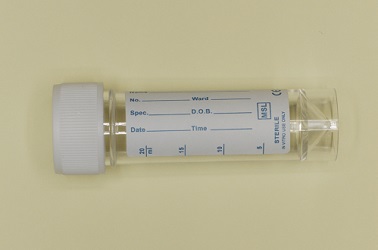Biofire Filmarray Meningitis/Encephalitis panel
Specimen Volume
Minimum volume 0.5mL (when only this test is required)Specimen Transport
Please bring to the laboratory immediately. Not to be sent via SDS pod system.Turnaround Time
24hrs (routine testing), and within 4 hours (urgent testing during core hours) from receipt in the laboratorySample Processing In Laboratory
Please notify the laboratory if urgent testing required outside of routine hoursSample Stability
CSF samples should be stored at ambient room temperature.General Information
Specimen volume and type:
Cerebrospinal fluid (CSF) from:
- Lumbar puncture
- Lumbar drain
- Shunts and Reservoirs
In suspected cases of meningitis or where urgent analysis is required; CSF should be sent immediately to the laboratory in a sterile universal container.
Notes
Where patients have been tested and found positive for HSV-1, HSV-2 or VZV DNA in their CSF by Biofire; this patient should be repeat tested 14 or 21 days later to confirm clearance in line with clinical guidelines.
CSF samples should not be sent via the Sample Delivery System (SDS).
The following pathogens are identified utilising the BioFire Meningitis/Encephalitis Panel: Haemophilus influenzae, Listeria monocytogenes, Neisseria meningitides, Streptococcus agalactiae, Streptococcus pneumoniae, Cytomegalovirus (CMV), Human herpesvirus 6 (HHV-6), Human parechovirus (HPeV), Varicella zoster virus (VZV), Enterovirus (EV), Herpes simplex virus 1 (HSV-1), Herpes simplex virus 2 (HSV-2), Cryptococcus neoformans/gattii.
Neurosurgical patients: if Biofire is thought to be required, please discuss with Microbiology Consultant prior to requesting.
Information Sharing: If your sample needs to be referred or a notifiable disease is detected from your sample, your details and sample may be shared with the UK Health Security Agency (UKHSA). This is a legal requirement. The UKHSA is sponsored by the Department of Health and Social Care.
Specifications
- EQA Status: Enrolled to Labquality Scheme
- EQAS Scheme: Yes








